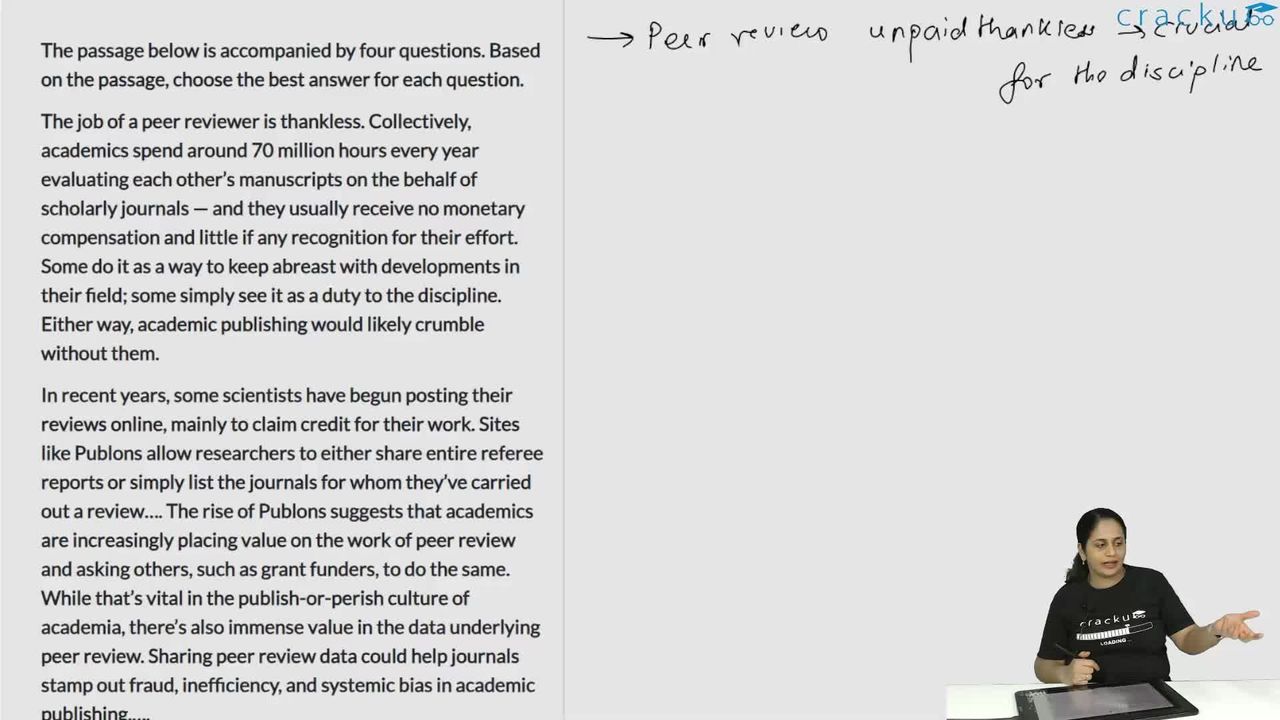Sign in
Please select an account to continue using cracku.in
↓ →
The passage below is accompanied by four questions. Based on the passage, choose the best answer for each question.
The job of a peer reviewer is thankless. Collectively, academics spend around 70 million hours every year evaluating each other’s manuscripts on the behalf of scholarly journals — and they usually receive no monetary compensation and little if any recognition for their effort. Some do it as a way to keep abreast with developments in their field; some simply see it as a duty to the discipline. Either way, academic publishing would likely crumble without them.
In recent years, some scientists have begun posting their reviews online, mainly to claim credit for their work. Sites like Publons allow researchers to either share entire referee reports or simply list the journals for whom they’ve carried out a review…. The rise of Publons suggests that academics are increasingly placing value on the work of peer review and asking others, such as grant funders, to do the same. While that’s vital in the publish-or-perish culture of academia, there’s also immense value in the data underlying peer review. Sharing peer review data could help journals stamp out fraud, inefficiency, and systemic bias in academic publishing.….
Peer review data could also help root out bias. Last year, a study based on peer review data for nearly 24,000 submissions to the biomedical journal eLife found that women and non- Westerners were vastly underrepresented among peer reviewers. Only around one in every five reviewers was female, and less than two percent of reviewers were based in developing countries…. Openly publishing peer review data could perhaps also help journals address another problem in academic publishing: fraudulent peer reviews. For instance, a minority of authors have been known to use phony email addresses to pose as an outside expert and review their own manuscripts.…
Opponents of open peer review commonly argue that confidentiality is vital to the integrity of the review process; referees may be less critical of manuscripts if their reports are published, especially if they are revealing their identities by signing them. Some also hold concerns that open reviewing may deter referees from agreeing to judge manuscripts in the first place, or that they’ll take longer to do so out of fear of scrutiny….
Even when the content of reviews and the identity of reviewers can’t be shared publicly, perhaps journals could share the data with outside researchers for study. Or they could release other figures that wouldn’t compromise the anonymity of reviews but that might answer important questions about how long the reviewing process takes, how many researchers editors have to reach out to on average to find one who will carry out the work, and the geographic distribution of peer reviewers.
Of course, opening up data underlying the reviewing process will not fix peer review entirely, and there may be instances in which there are valid reasons to keep the content of peer reviews hidden and the identity of the referees confidential. But the norm should shift from opacity in all cases to opacity only when necessary.
According to the passage, some are opposed to making peer reviews public for all the following reasons EXCEPT that it
Let's evaluate the options:
Option A: The passage mentions this concern: "referees may be less critical of manuscripts if their reports are published, especially if they are revealing their identities by signing them."
Option B: The passage does not mention that one of the reasons to oppose open peer review is to protect reviewers from unwarranted and unjustified criticism. Instead, the passage discusses the concern that reviewers may avoid giving critical feedback if their identities and reports are made public, not because they want to avoid unjust criticism. The key concern is the fear of justified criticism rather than avoiding unjust or unwarranted criticism.
Option C: The passage mentions that reviewers may be less critical in their reports if they fear their reviews will be published. This might prevent reviewers from being honest and offering critical assessments, which are crucial for the integrity of the publishing process.
Option D: Another concern raised in the passage is that reviewers might take longer to submit their reviews if they know they will be publicly scrutinized. This delay in the review process is seen as a disadvantage of open peer review.
Therefore, option B is the correct answer because the passage does not mention concerns about leaving reviewers unexposed to unwarranted criticism.

Click on the Email ☝️ to Watch the Video Solution
Create a FREE account and get:
Educational materials for CAT preparation